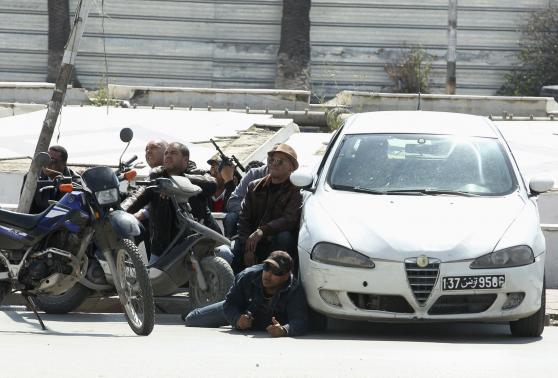
(Reuters) – Gunmen opened fire on tourists getting off buses outside Tunisia’s national museum on Wednesday, killing seven foreigners and a Tunisian and taking others hostage inside the building, witnesses and officials said.
Security forces stormed the Bardo museum in central Tunis around two hours later and killed two militants, freeing all the captives, a government spokesman said. Polish and Italian tourists were among the wounded, officials added.
One policeman was killed in the police operation.
Television footage showed dozens of people, including elderly foreigners and one man carrying a child, running for shelter in the compound next to the parliament, covered by security forces aiming rifles into the air.
The attack on such a high-profile target is a blow for the small North African country that relies heavily on European tourism and has avoided major militant violence since its 2011 uprising to oust autocrat Zine El-Abidine Ben Ali.
Police could not immediately say who the gunmen were.
But several Islamist militant groups have emerged in Tunisia since the uprising and authorities estimate about 3,000 Tunisians have also joined fighters in Iraq and Syria — raising fears they could return and mount attacks at home.
“Two militants opened fire on the tourists as they were getting off the buses before fleeing into the museum,” one Bardo employee told Reuters at the scene.
An official at the Italian foreign ministry in Rome said two Italians had been wounded in the attack.
About another 100 Italians were in the area and had been taken to safety by Tunisian police, authorities added.
The Polish foreign ministry spokesman said on his Twitter account during the siege that “as of now” three Polish citizens were wounded.
The museum is known for its collection of ancient Tunisian artifacts and mosaics and other treasures from classical Rome and Greece. There were no immediate reports the attackers had copied Islamic State militants in Iraq by targeting exhibits seen by hardliners as idolatrous.
Tunisia’s uprising inspired “Arab Spring” revolts in neighboring Libya and in Egypt, Syria and Yemen. But its adoption of a new constitution and staging of largely peaceful elections has won widespread praise and stood in stark contrast to the chaos that has plagued those countries.
Islamic State affiliates are gaining a foothold in neighboring Libya where two rival governments are battling for control. A senior Tunisian militant was killed while fighting for Islamic State in the Libyan city of Sirte over the past week, authorities said.
Wednesday’s assault was the worst attack involving foreigners in Tunisia since an al Qaeda suicide bombing on a synagogue killed 21 people on the tourist island of Djerba in 2002.
(Additional reporting by Mohamed Agoubi and Valentina Consiglio in Italy; Writing by Patrick Markey; Editing by Andrew Heavens)







